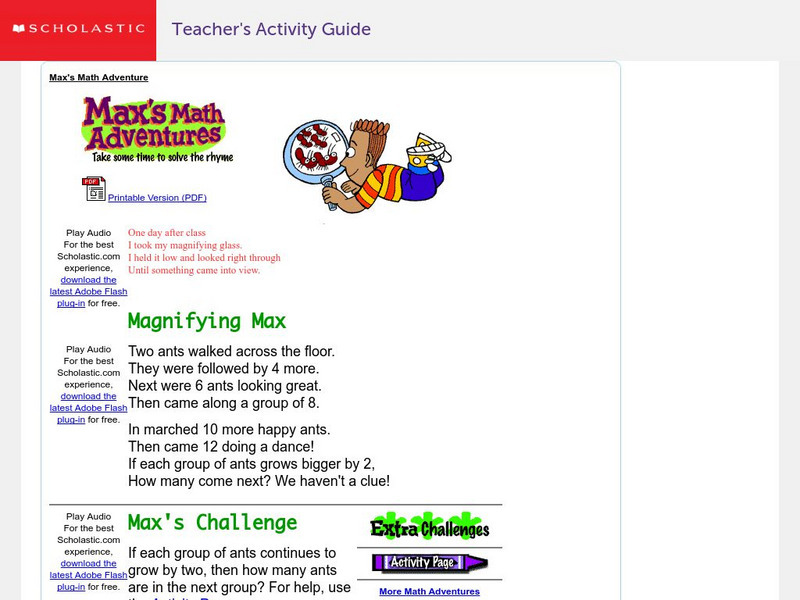Hi, what do you want to do?
Curated OER
You Are Where You Live
Third graders observe insects in a number of habitats. They recognize which insect characteristics are adaptations to their habitats.
Curated OER
Missing Macroinvertebrates
Learners investigate the concept of a macroinvertebrate. They observe the presence of increases or decreases in population in order to test for factors that contribute to the extinction of a species. Students predict the likelihood of...
Curated OER
All Hands On Deck
Young scholars study estuaries and are able to define one, and describe its features. In this investigative lesson students participate in an activity that shows them the importance of estuaries.
Curated OER
Ellsworth Kelly
Students examine and discuss artwork by the artist Ellsworth Kelly. They create an abstract picture of two-dimensional geometric shapes using Kid Pix software based on a photograph taken by the student.
Curated OER
Get Out in the Field
Students visit a shoreline--of an ocean, a lake, a pond, a riverbank, etc., survey it and record what they find there. They map the shoreline and surrounding area and conclude where potential waterfront projects could occur.
Curated OER
Dishing the Dirt Part 1
Students create a soil center on their school grounds. They begin to write in their science journals. They participate in an experiment that helps the community begin their own gardens.
Curated OER
Paper
Learners study the process of creating paper. They read and discuss a flier and visit centers in small groups to study Paper Fun, Historical Paper, What Paper Is Made Of, and Homemade Paper. After visiting each center, they share the...
Curated OER
Our Schoolsyard is Full of Biology
Students study the habitats found in their schoolyard. They apply firsthand, what they have learned in the classroom to something familiar to them. Students look at biotic, abiotic habitats. Small groups will present their findings to...
Curated OER
Have You Ever Wondered?
Young scholars use their personal knowledge and the Internet to discover where and how spiders live. In groups, they discuss their experiences with spiders and how their lives differ from other insects. They use new vocabulary to discuss...
Curated OER
Activity #9 A State Debate!
Young scholars list individual properties of solids, liquids, and gases. They examine that some properties have more than one state of matter. Pupils consider whether shaving cream, is a solid, a liquid, or a gas, or some combination.
Curated OER
Who says I can't be Sherlock Holmes?
Pupils create a "crime scene" in their classroom and have to tell what's out of place. The class is given a set of cards that are all face down and have to play concentration. If they get a matched pair, they get both cards. Whoever has...
Curated OER
Soil Layers
Ninth graders identify the different layers of soil. In this earth science lesson, 9th graders explain how limestone layers are formed. They identify the different parts of the coral colony.
Curated OER
A View of the Cell
In this viewing of a cell worksheet, students will read a paragraph about how microscopes work and will use a diagram of a light microscope to complete 2 short answer questions.
Curated OER
Flowers Galore
Students create original works of art using their knowledge of Georgia O'Keeffe's artwork, flowers, pencils, crayons, and pastels in this K-6 Art lesson. The lesson includes Georgia O'Keeffe resource links and a recommended reading list.
Curated OER
Ecosystem Energizers
Fourth graders see how the flow of energy through an ecosystem made up of producers, consumers, and decomposers carries out the processes of life and that some energy dissipates as heat and is not recycled.
Curated OER
Lenses and Telescopes
Middle schoolers examine telescope construction. For this telescope lesson, students examine the lenses used in telescopes by exploring with convex and concave lenses.
Curated OER
Science: Exploration Tubs
First graders develop skills of scientific inquiry. They determine which objects float and which sink.
Curated OER
Microscopes Online
In this microscopes worksheet, students access a website to complete questions about the early compound microscopes and the scientist involved in the development. This worksheet has 1 graphic organizer, 7 fill in the blank, and 10 short...
Science Education Resource Center at Carleton College
Serc: Magnify It
In this lesson, students will view their finger from various viewing distances to discover that their visual field is limited and a magnifying glass is a tool that can help make something look bigger. Students will record what they see...
Scholastic
Scholastic: Max's Math Adventures: Magnifying Max
This site has the view through Max's magnifying glass. The ants seem to be walking past him in a pattern, can you help him predict how many ants are coming next? Teachers will like the teacher's guide, activity sheet, and extra challenges.
Exploratorium
Exploratorium: Make Your Own Telescope
At this site students can make their own telescope and see how it works with this experiment. Out of a light, a pair of glasses, a magnifying glass and wax paper.
Exploratorium
Exploratorium: Science Snacks: Giant Lens
A discussion of how to make a refraction exhibit using a Fresnel lens. Consists of assembly instructions and a "To do and notice" section.
TeachEngineering
Teach Engineering: Stations of Light
Student groups rotate through four stations to examine light energy behavior: refraction, magnification, prisms and polarization. They see how a beam of light is refracted (bent) through various transparent mediums. While learning how a...
Exploratorium
Exploratorium: Water Sphere Lens
A discussion of how to make a magnifying lens exhibit using a water-filled flask and a light bulb. Consists of assembly instructions and a "To do and notice" section. Great for a teacher demonstration or a student project.




























